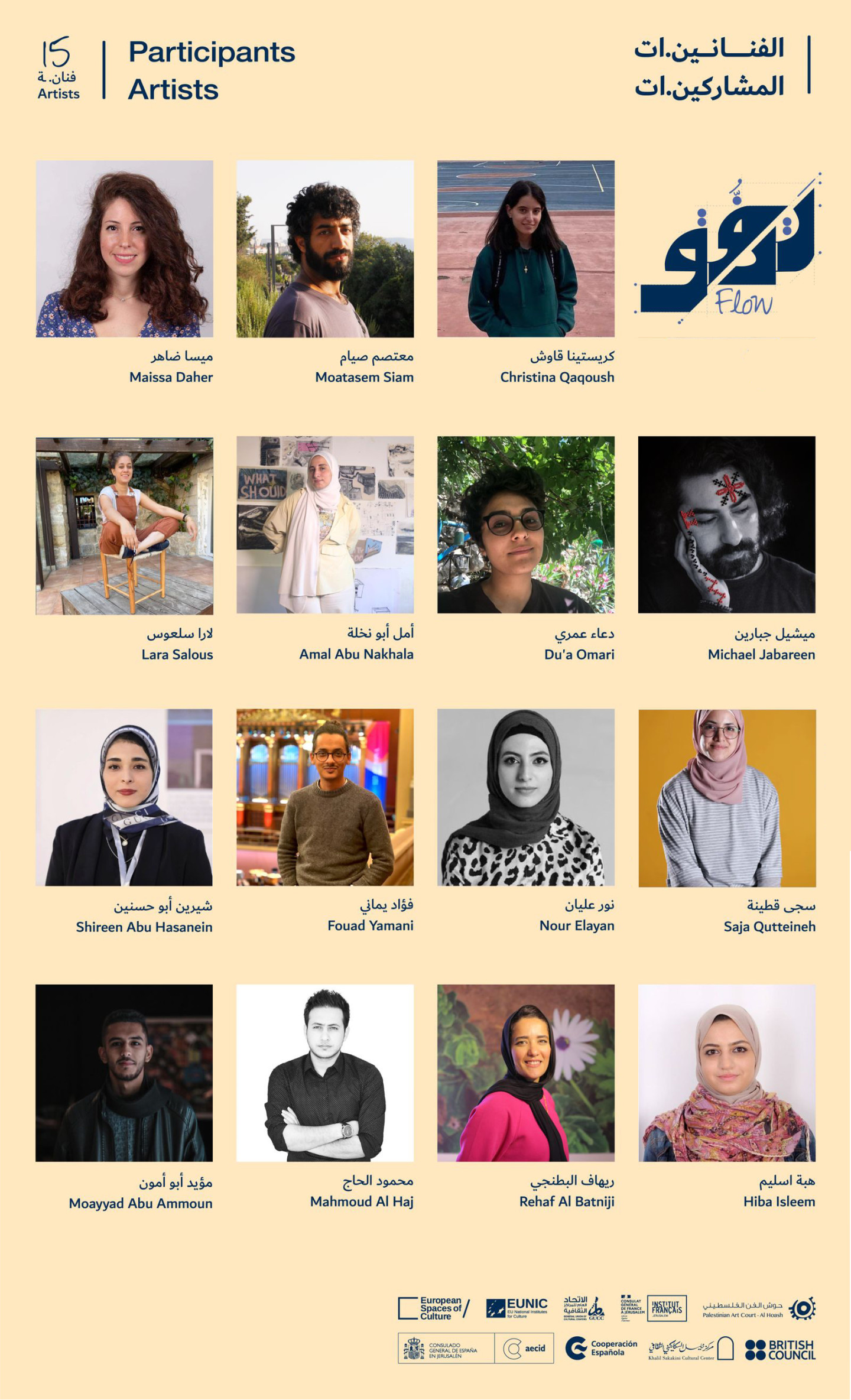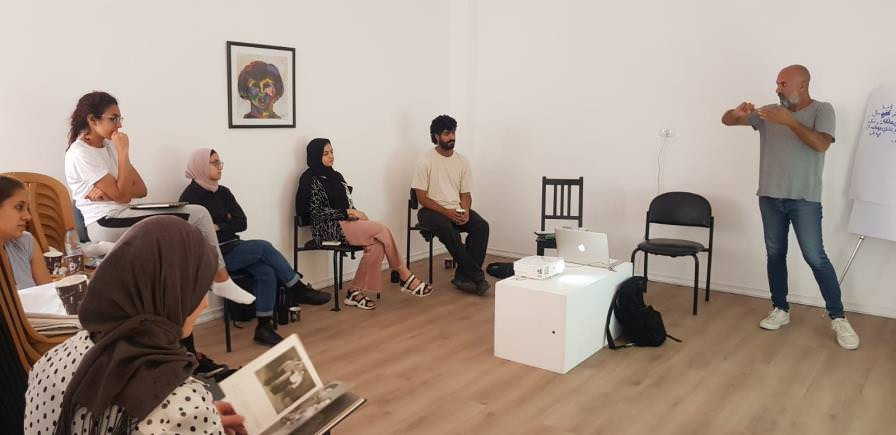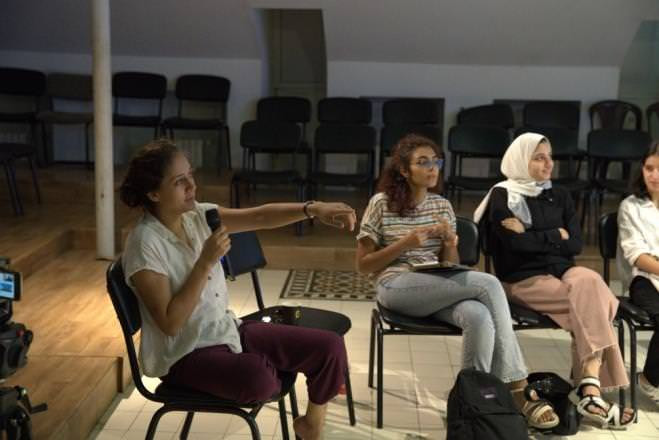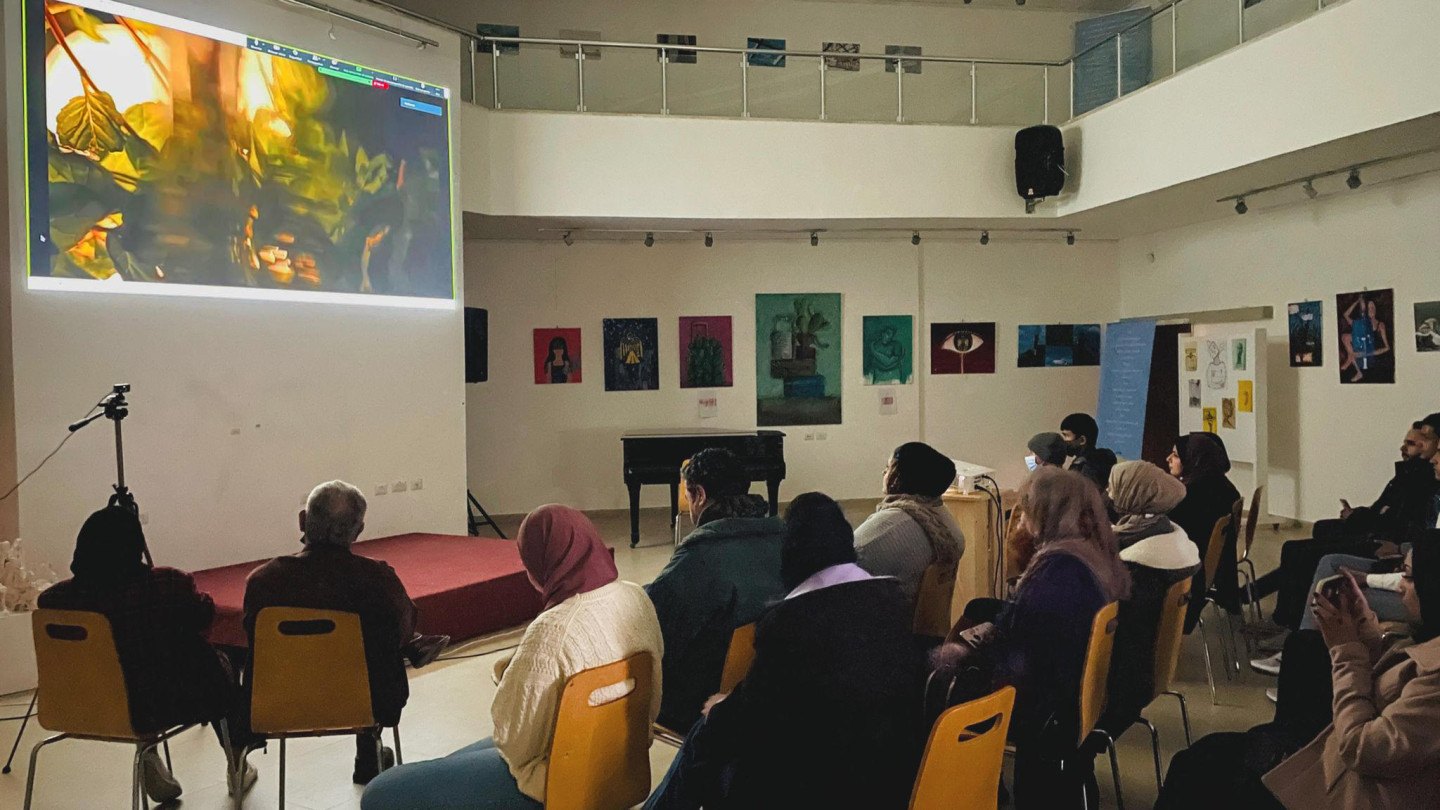Artistic vibrancy in Palestine is stymied by multiple constraints, including the 15-year blockade of Gaza and movement restrictions in the West Bank which disrupt the mobility of creatives, reducing their ability to exchange, develop creatively, and showcase their works. The isolation of Gaza affects artists’ lives on an emotional, material and professional level and hinders artistic development.
Tadafuq / تدفق : Contemporary Art Programme in Palestine has been supporting a new generation of Palestinian visual artists from Gaza, West Bank and Jerusalem, to unleash their full artistic and professional potential in an innovative and inclusive cultural exchange project.
Access to institutional education on contemporary art is not possible in Gaza; artists from Gaza are almost entirely restricted from going to the West Bank/Jerusalem or an international destination; it is almost impossible for West Bank/Jerusalem artists to visit Gaza. This collaborative European-Palestinian project will create new opportunities, open doors for networking, and build the capacity of a new generation of Palestinian artists.
Through innovative cultural exchange, Tadafuq ("Flow") has honed the visual artists' skills, expanded their artistic horizons, and facilitated critical dialogues on contemporary art in local and global contexts. The program's emphasis on digital visual arts acknowledges its predominantly online structure while ensuring a balance of diverse contemporary practices.
Themes spanned a spectrum reflecting the varied teaching staff, striving for East/West equilibrium and addressing present issues like de-colonialism and diversity. Ultimately, the program equips exceptional artists with tools tailored to their interests, fostering artistic growth and innovation. Master classes, discussions, and mentorship have accelerated their professional skill development and creative thinking, fostering a harmonious environment of growth and collaboration.
Tadafuq greatly benefits me by exposing me to new artistic realms and allowing me to draw from artists' experiences, fostering innovation and a new artistic vision.
Amal Al-Nakhla, drawing and animation artitst from Gaza
Tadafuq set itself as aim to enable a new generation of visual artists in Palestine to achieve their artistic and professional goals creating a new and powerful present with a great community impact. In the face of severe access and mobility restrictions and growing geographical fragmentation in the Palestinian territories, the project has connected and shared knowledge between Palestinian artists and buildt the capacity of the emerging Palestinian visual arts scene to establish a strong network and engage the next generation and strengthened artistic collaboration between artists from Gaza, West Bank and Jerusalem through freedom of communication and artistic creation.
However, since 7 October 2023, the political situation in Palestine worsened due to the bombardment that Gaza endured, leading to the cancellation of art exhibitions and the suspension of the project due to the challenging circumstances. Consequently, all project-related arrangements with previously engaged parties were disrupted. Despite the difficulty of communication, there was ongoing contact with the participating artists, although it was challenging to reach the artists located in Gaza. Unfortunately, the political situation has not calmed down to this day and has further escalated, leaving a deep impact on all artists and partners, inside and outside the country due to the human losses witnessed during this difficult period.
Supporting Palestinian artists to unleash their full artistic and professional potential
Tadafuq was designed in response to the creative demand of artists in Palestine, which thanks to this European-Palestinian partnership will be further developed to a new scale for a greater impact locally and internationally. It was composed of three pillars (a) training and support programme consisting of masterclasses (also open to the public) and individual mentoring sessions for emerging artists led by Palestinian and European cultural professionals (b) provision of grants to enable artists to produce individual art projects and (c) curation of an exhibition to be presented in Palestine and Europe.
The project targetted emerging artists from Gaza, West Bank and Jerusalem, who have begun to develop their practice but lack the means, techniques or access to current international contemporary art trends. In the selection of artists, women were be prioritised (at least 50% of participants) given that they face greater barriers in developing their professional artistic practices.
The 2023 programme was composed of integrated interventions co-created by local and EU project partners:
- Masterclasses, delivered by Palestinian (local residents and in diaspora) and European professionals were held once a week during 6 months for a total of 72 hours. They will be broadcast live via videoconference, open to the public, and recorded and stored on an open access platform, while an online publication will also be prepared.
- An open call to artists selected five artists from Gaza, five from Ramallah, and five from Jerusalem to follow a mentoring programme with Palestinian professionals (both in Palestine and from the diaspora). The mentors were assigned according to the theme/discipline that each artist undertakes. The sessions guided the artists in the production of their individual artistic projects. In total, each artist benefited from 12 hours of session over a period of 6 months. Small grants were disbursed to the 15 artists to help them produce and complete their individual art projects by the end of the training/support programme.
- A touring exhibition was planned to be curated to showcase the produced artworks from October 2023 in the venues of the three local partners, and to afterwards travel forward to the EU starting with Casa Árabe in Madrid, and two more venues in France and the United Kingdom, with the help of the European partners.
The programme has connected artists in the Palestinian territories with Palestinian artists in the diaspora, strengthening bridges and allowing direct constant contact with artists coming from different realities and working in the context of the EU/UK. This high-level professional artistic network will enable strong artistic projects to grow and create a greater impact.
Experience for artistic growth and cross-cultural enrichment
The programme prioritized equilibrium among diverse contemporary practices, with particular emphasis on digital visual arts due to its online format. Themes were thoughtfully diverse to align with the varied teaching staff, striving for a harmonious East/West synthesis. These themes addressed present-day issues like de-colonialism, diversity, identity, mental health, ultimately providing a toolkit tailored to each artist's interests and aspirations.
Participant feedback indicates a profound impact, with artists like Dua Omari from Jerusalem highlighting the project's value in enriching their artistic perspectives. Dua expressed gratitude for exposure to diverse artistic directions, both local and international, which greatly enhanced her creative journey. This sentiment resonates with other participating artists who found the experience invaluable for their artistic growth and cross-cultural enrichment.
Tadafuq introduced me to diverse artistic perspectives and enriched my artistic thinking for the future.
Lara Salous, architect and fabric artist from Ramallah
Through its inclusive governance structure, local ownership of the project was facilitated throughout, empowering the local institutions (in West Bank, Jerusalem, and Gaza) to implement a new edition of the project in the next years incorporating new local and international partners. Partners played an instrumental role in the programme's success, demonstrating proactive commitment to their tasks and timely delivery.
Overcoming geographical challenges between Jerusalem, the West Bank, and Gaza was achieved through continuous follow-up, effective task management, and a shared dedication to optimal outcomes. The partnership was built on equitable opportunities, prioritizing Tadafuq's success and fostering a positive work atmosphere. Communication between administrative staff and artists was consistently professional, reinforcing the project's objectives.




